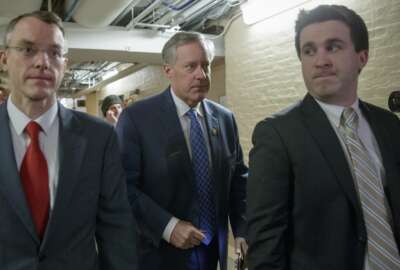

Congress is in the midst of "reforming" the federal government by rounding up overpaid bureaucrats and whittling back their break-the-bank benefits.
Unless they grew up in the District of Columbia, or its Maryland and Virginia suburbs, most newly-elected members of Congress probably pray they won’t be assigned to the House Committee on Oversight and Government Reform. It doesn’t have the sex appeal of foreign affairs, or the clout of places that deal with the judiciary, the armed services or banking and finance. Five of the 40-plus members of the committee are from Maryland (3) Virginia (1) and the District of Columbia (1).
The committee can’t be a fun place for the typical House member from Iowa, Kentucky or Ohio. Those of us who live and work in D.C., especially if we’ve been here a long time, forget how unpopular we are in the rest of the country. New York City got a (well-deserved) sympathy break on and after 9/11. Our brush with terror (the attack on the Pentagon) not so much.
A 30-minute drive, in any direction, outside the Beltway puts you in territory where many, if not most, people are suspicious of government and scornful of people who make careers as civil servants.
Unless you are from the D.C. area (with 14 percent of the federal workforce), you can probably win more votes — and better represent voters — by treating federal workers as whack-a-mole targets. The five D.C.-area committee members, all Democrats, get reelected fighting for their districts’ largest group of workers.
Given the way things are, it is not surprising that the committee, again, is out to reform the civil service. Reform, for some, being a code word for “take names and kick butts.” Specifically yours, if you work for the government or did but are now retired. The committee, again, has launched a campaign to finally get Uncle Sam ship-shape and to take another look at “overpaid” civil servants, with their overly generous and very expensive retirement programs. Like the key line from the movie classic Casablanca, it’s a round-up-the-usual-suspects operation. Although it’s hard to compete with the good-bad-publicity machine operating out of 1600 Pennsylvania Ave. NW these days, the committee has some usual-suspects hot spots. Such as:
Official data from the executive branch says that many feds, especially in higher-level jobs, are grossly underpaid compared to their counterparts in the private sector. Critics say this is like having the inmates running the asylum. Their studies show feds living off the fat of the land. Their mission is to convince enough people that feds are too generously compensated and do something about it.
Both the old Civil Service Retirement System and the Federal Employees Retirement System that replaced it are generally better — in most cases much, much better — than anything available in the private sector. Even among those enlightened but fast-disappearing companies that still have retirement systems. Expect the newest reform drive to include proposals to make the CSRS and FERS formulas less generous, to require workers to pick up more of the costs of funding the program. They may also revive a plan to base annuities on the employee’s highest five years of service. Currently, benefits are based on length-of-service, salary and the employee’s highest three-year average salary.
The committee may also revive a proposal — once advocated by the Obama administration — to trim future retirement benefits by using a different (less generous to retirees) formula to compute future cost-of-living adjustments. While it’s been dormant for several years, it is out there waiting for some member who wants to make an anti-feds splash to rediscover, and round it up. Although most federal-postal union operatives say it is a very long shot, it is still out there. If Social Security benefits could be shielded from the so-called Chained CPI, it might be an easy sell in the House. For a look at how it would impact your future monthly CSRS and FERS retirement, click here.
President Donald Trump’s budget, due out this week, will likely contain many of the “reforms” proposed in the past. What happens is up to Congress.
If past performance means anything, feds are probably safe from any major (maybe even minor) reforms again this year. And next. But when you hear the wolf pack howling, even though it’s never gotten into the fort, it is off-putting for new workers facing their first “reform” and feds close to retirement who don’t want any changes or surprises.
By Michael O’Connell
The 1995 movie “The Usual Suspects” is on film critic Roger Ebert’s “Most Hated” list.
Source: IMDB
Copyright © 2025 Federal News Network. All rights reserved. This website is not intended for users located within the European Economic Area.
Mike Causey is senior correspondent for Federal News Network and writes his daily Federal Report column on federal employees’ pay, benefits and retirement.
Follow @mcauseyWFED

